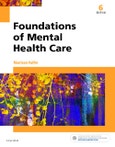- Sample Client Care Plans address how members of the health care team work collaboratively to meet client needs. - Realistic case studies illustrate chapter concepts, strengthen critical thinking, and ensure you consider psychosocial aspects of therapeutic care. - Critical Thinking boxes include practice scenarios and contain thought-provoking client issues and questions that stimulate critical thinking. - Cultural Consideration boxes highlight cultural issues and encourage you to attend to the mental health needs of culturally diverse clients. - Drug Alert boxes focus attention on medication issues and identify the risks and possible adverse reactions of psychotherapeutic medications. - Key terms with phonetic pronunciations, text page references, and a comprehensive glossary strengthen your understanding of mental health terminology. - Numbered chapter objectives provide a framework for the chapter content and the accompanying TEACH Lesson Plans. - NEW! Content on the impact of the Affordable Care Act on mental health coverage and treatment informs you of the most current treatment options. - NEW! Up-to-date coverage of the latest psychotropic medications emphasizes the most recent findings in safe pharmaceutical treatment in mental health care. - EXPANDED and NEW! Increased coverage of mental health surrounding mass violence keeps you up to date on the latest issues and approaches to treatment. - UPDATED! Current content on mental health issues and returning war veterans highlights mental health disorders affecting this population. - NEW! Discusses emerging mental health issues surrounding usage of electronic devices and the Internet, such as addiction. - NEW! Addresses updated DSM 5 diagnoses within appropriate chapters to ensure you have the latest information on new mental health diagnoses recognized by the American Psychiatric Association.
Table of Contents
UNIT ONE: MENTAL HEALTH CARE: PAST AND PRESENT 1. The History of Mental Health Care 2. Current Mental Health Care 3. Ethical and Legal Issues 4. Sociocultural Issues 5. Theories and Therapies 6. Complementary and Alternative Therapies 7. Psychotherapeutic Drug Therapy
UNIT TWO: THE CAREGIVER'S THERAPEUTIC SKILLS 8. Skills and Principles of Mental Health Care 9. Mental Health Assessment Skills 10. Therapeutic Communication 11. The Therapeutic Relationship 12. The Therapeutic Environment
UNIT THREE: MENTAL HEALTH PROBLEMS THROUGHOUT THE LIFE CYCLE 13. Problems of Childhood 14. Problems of Adolescence 15. Problems of Adulthood 16. Problems of Late Adulthood 17. Cognitive Impairment, Alzheimer's Disease, and Dementia
UNIT FOUR: CLIENTS WITH PSYCHOLOGICAL PROBLEMS 18. Managing Anxiety 19. Illness and Hospitalization 20. Loss and Grief 21. Depression and Other Mood Disorders 22. Physical Problems, Psychological Sources 23. Eating and Sleeping Disorders 24. Dissociative Disorders
UNIT FIVE: CLIENTS WITH PSYCHOSOCIAL PROBLEMS 25. Anger and Aggression 26. Outward-Focused Emotions: Violence 27. Inward-Focused Emotions: Suicide 28. Substance-Related Disorders 29. Sexual Disorders 30. Personality Disorders 31. Schizophrenia and Other Psychoses 32. Chronic Mental Health Disorders 33. Challenges for the Future
Appendixes A: Answers to Review Questions for the NCLEX-PN® Examination B: Mental Status Assessment at a Glance C: A Simple Method to Determine Tardive Dyskinesia Symptoms: AIMS Examination Procedure Bibliography and Reader References Glossary








